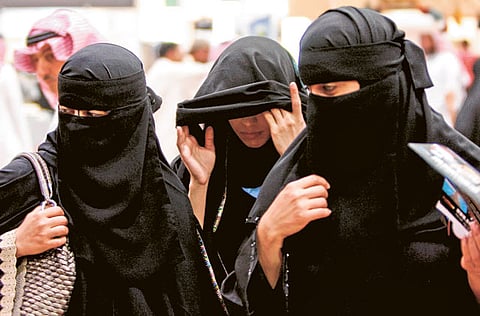Saudi women not open to change
Some explain their indecision as a fear that they might have to assume responsibilities they are incapable of undertaking

What do Saudi women want? I wish I could give you an easy answer. But Saudi Arabia is a diverse land, spread out across a vast territory almost a fourth the size of the US and divided by religious sects and among some 45 tribes.
Divining the Saudi people's demands, never mind those of Saudi women, is no simple task. By law, every Saudi woman has a male guardian.
At birth, the guardianship is given to her father and then upon marriage to her husband. If a woman is a widow, her guardianship is given to her son — meaning that she would need her own son's permission for the majority of her interactions with the government, including the right to travel abroad.
Legal recourse is difficult to obtain, especially because abuse is only recognised when it's physical abuse. Even then, the Saudi justice system is patriarchal, bordering on the misogynistic.
For example, to this day the Justice Ministry has not issued a law banning child marriage, leaving the decision at the discretion of the girl's father.
You would think that women living under these conditions would long for liberty, independence, and civil rights.
Many do, as this year's driving campaign makes clear. However, it's just not that simple.
Ready for change
Millions of others are still not sure they are ready for change. Some explain their indecision as a fear that they might have to assume responsibilities they are incapable of undertaking.
One fellow Saudi tells me that she sees what women have to put up with abroad: "I see how American women have to run around the city running errands, and I don't want to open that door. As long as women driving is banned, no one will have these expectations for me," she says.
In fact, Saudi Arabia may be even more conservative than most outsiders think. There are some who are not only passively happy with the status quo but also loud in their resistance to any form of change.
Campaign
In 2009, a Jeddah woman named Rawdah Al Yousuf, in collaboration with members of the royal family, organised a campaign to strengthen the guardianship system. It was called "My Guardian Knows What's Best for Me." They urged the king not to give in to local activists and international human rights organisations regarding the guardianship system.
Another campaign gathered thousands of signatures from both men and women calling for the extension of gender segregation laws to hospitals — the same segregation laws that have led to Saudi women only making up 15 per cent of the national workforce and an unemployment rate for women so high that the government won't release the numbers. The only public places where these laws are not enforced are malls and hospitals. Yet there are Saudis who would like to see segregation even there.
School system
None of this is a surprise, considering what is being taught in the public school system. In religion classes, students learn that the Saudi interpretation of Islam supersedes any worldly concepts of human rights.
Women have the most to lose, yet these ideas are so ingrained that I defy you to find a report of a Saudi mother complaining about what her children are being taught.
Women in most countries may take their aspirations for freedom for granted, but for many of us, it is brand new.
An exasperated expatriate in Riyadh once expressed to me how frustrated she was with the requirement to wear an abaya everywhere. She wondered: How do you all put up with having to cover your faces for your whole adult lives? What she didn't realise was that many Saudi women look at her and wonder: How can she walk around without an abaya? How is it that she doesn't feel exposed and naked?
Yet I am happy to say that I am one of many women hungry for self-determination — women who have realised that though liberty and rights come with responsibility, it also gives them and their daughters the autonomy to pursue their happiness.
And yes, there are hundreds, if not thousands, of Saudi women who are fighting for their rights — and the well-covered driving campaign is just one of many battles, from fighting for the right to manage their own businesses to being allowed to freely leave and enter the country without their guardian's permission.
Even something as simple as recognising women lawyers in our judicial system could be transformational. And that, of course, is why it is so hard.
— Washington Post
Eman Al Nafjan, a 2011 Foreign Policy magazine Global Thinker, blogs at Saudiwoman's Weblog.


